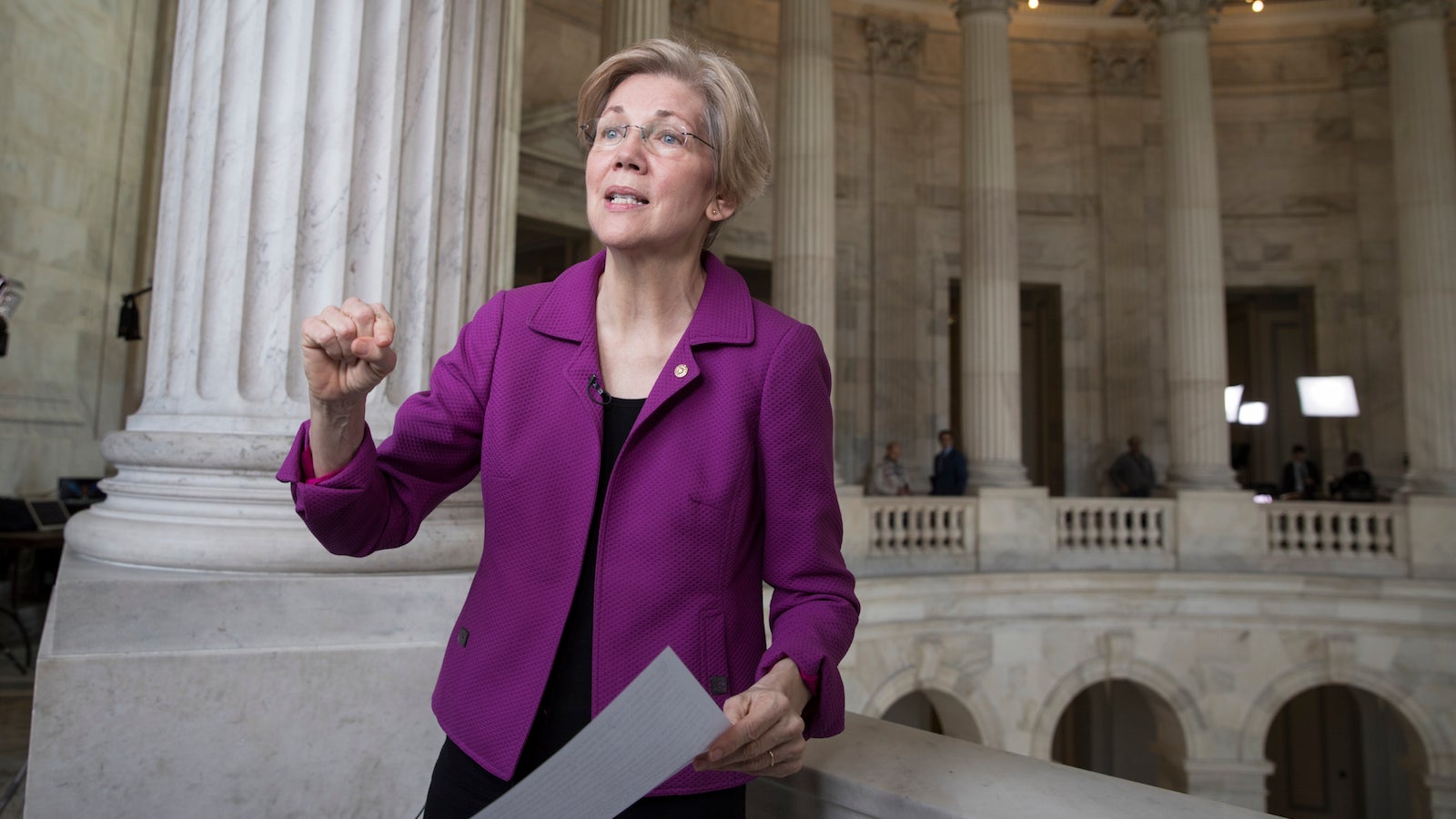#ShePersisted is more powerful as a rallying cry for women than #NastyWoman could ever be
With three sentences on the US Senate floor this week, US Republican majority leader Mitch McConnell handed president Donald Trump’s resistance its next battle cry.


With three sentences on the US Senate floor this week, US Republican majority leader Mitch McConnell handed president Donald Trump’s resistance its next battle cry.
Defending his decision to block—with a party-line vote—Elizabeth Warren from speaking Feb. 7 against the confirmation of Jeff Sessions as attorney general, McConnell uttered the words that went on to become a “weaponized meme”:
“She was warned,” he said. “She was given an explanation. Nevertheless, she persisted.”
Sen. Warren had been trying to read out a 1986 letter written by Coretta Scott King, the widow of Dr. Martin Luther King Jr., criticizing Sessions’ civil rights record. Presiding Senate chair Steve Daines, of Montana, interrupted, warning Warren that she was breaking Senate Rule 19, which prevents senators from using “any form of words [to] impute to another Senator … any conduct or motive unworthy or unbecoming a Senator.” Warren continued anyway, prompting McConnell to intervene and enact a highly unusual Senate vote, using the chamber’s Republican majority to effectively silence Warren for the duration of the debate.
The next day, Sessions was confirmed. But McConnell’s words left a lasting impression, striking a dismissive note familiar to many women. The hashtag #ShePersisted quickly took on a life of its own, and it—alongside #LetLizSpeak—soon became the top trending hashtags on Twitter. Thousands posted images of trailblazing women such as Harriet Tubman, Wendy Davis, Malala Yousafzai, Princess Leia, and Rep. Shirley Chisolm.
As Megan Garber put it in the Atlantic, McConnell’s rebuke of Warren struck a chord for women from all walks of life:
There are many ways that American culture tells women to be quiet—many ways they are reminded that they would really be so much more pleasing if they would just smile a little more, or talk a little less, or work a little harder to be pliant and agreeable. Women are, in general, extremely attuned to these messages; we have, after all, heard them all our lives.
Indeed one would be hard-pressed to find a woman, person of color, disabled person, or LGBT person who does not know the quiet resilience that #ShePersisted evokes—the humble, daily decisions to keep working, keep fighting, and keep believing despite the inevitable obstacles those in power will present.
The rise of #ShePersisted recalls another quickly meme-ified moment: when Donald Trump, during the final presidential debate, muttered that Hillary Clinton was “such a nasty woman” after she snarkily referenced his reported avoidance of taxes.
The hashtag #NastyWoman went viral, as women half-humorously, half-furiously appropriated Trump’s insult. For the young women, feminists, and activists in Clinton’s base, the “Nasty” ethos had an appealing badassness to it: If standing up to a bullying man and running for president is “nasty,” then deal me in!
But the #NastyWoman story didn’t end particularly well. Bold headlines made it sound like Trump had instantly lost the female vote: ‘Bad Hombres’ and ‘Nasty Women’: Internet Unites to Slam Donald Trump’s Debate Remarks, declared one; Trump Finally Pissed Off the Wrong Women. All of Them, asserted another. But on election day, 53% of white women voted for Trump—showing that Clinton’s campaign, and “nasty woman” rhetoric, had failed to ignite support beyond her base.
The “nasty” label has continued to resonate after the elections, at marches and beyond. But while many liberal women rally behind the term, some others have said they find the concept unappealing.
#NastyWoman seemed to empower only a subset of women, and that made all the difference. As polls after the Access Hollywood tape demonstrated, much of the electorate was unfazed by Trump’s misogyny. Many women were uncomfortable embracing the #NastyWoman brand of badass, commercialized feminism, just as many Americans living in economically depressed central and rural US communities felt ignored by Clinton’s assertion that “America already is great.”
While it’s too early to measure the reach of #ShePersisted, it has potential to resonate far more broadly than #NastyWoman ever could. The young feminists and activists that helped Clinton win the popular vote remain as important as ever. But for 2020 to turn out differently, women who voted for Trump, and those who didn’t vote at all, must be mobilized.
These women face the same hurdles, indignities, and abuses that galvanized Clinton’s supporters. And they know just as well that even when one is warned, even when one is explained to, persistence is sometimes the only path forward.
Such quiet persistence is driven not by promise of praise or celebration—but by a conviction that there’s progress to be made. That Sessions was confirmed as attorney general the day after McConnell’s reprimanding of Warren only confirms the necessity of that resilience.
Warren certainly knows the value of persistence. After her reading was shut down by Republicans, she found herself a quiet space outside the Senate, sat down, and calmly read King’s letter into Facebook Live.
The video has now been watched 12 million times.